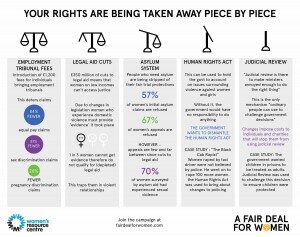
****Vital updates to this page coming soon! Look out for ‘Fair Deal for Women Report – Part 3: Women Speak Out on Media, Attitudes, Power and Human Rights’****
If you think that these issues we have highlighted on this website are unfair, you may want to question them.
However, asking questions is becoming more difficult. There are five main ways in which you can ask questions when you think something is unfair, all of them are either under review, undergoing changes, or being dismantled. All of these changes pose huge worries for women.

Sources
Employment Tribunals
The recent introduction of £1,200 fees for individuals bringing employment tribunals has meant that women have stopped questioning unequal pay, sex discrimination, and pregnancy dismissal. Since the fee was introduced, there have been: 84% fewer equal pay claims, 81% fewer sex discrimination claims, and 26% fewer pregnancy dismissal claims.
Cuts to Legal Aid
£350 million of cuts to legal aid means that women cannot access legal remedies in relation to issues like welfare benefits, housing problems or immigration issues.
For example, women affected by violence must provide evidence of domestic violence in order to be eligible for family law legal aid. One in three women who experience violence and need legal advice and representation in the family courts cannot provide the evidence they need to get Legal Aid.
The knock on effect of women not being able to go to court is that they don’t even come forward and are therefore trapped in violent relationships. This is horrifyingly dangerous for women and their children.
Public Sector Equality Duty
This ensures that public sector organisations cannot act in a discriminatory way, both in an individual way, and in the way they provide services to the population. This is important for women who rely more on services and need a fair deal from the public sector.
The Duty replaced the race, disability and gender equality duties (the race equality duty was created after the McPherson report found institutionalised racism in the Met Police after the murder of black teenager Stephen Lawrence).
The Duty is up for review even though it has only been in place for two years.
Human Rights Act
This legislation is used to hold public bodies to account on how they work to combat violence against women and girls (amongst other things, of course). Without it, the Government could claim to have no responsibility to do anything.
The Human Rights Act was used, for example, in the case of the ‘Black Cab Rapist’ after women who had been raped went to the Metropolitan Police but were not believed. When he went on to rape another 100 women and was finally caught, campaigners could push for changes to policing so that women’s experiences would not be ignored in the future.
Successive Governments want to dismantle the Human Rights Act entirely, claiming that it is unnecessary.
Judicial Review changes
“Judicial Review is there to make Ministers annoyed enough to do the right thing” — Tory Peer
This is the only mechanism by which ordinary people can challenge Government decisions.
For example, when the Government wanted to treat children in prison as adults, campaigners used Judicial Review to successfully challenge, so that children are treated as, and protected as children.
Recent changes impose considerable costs to individuals and to the charities that support them, that will stop them from using Judicial Review.
When women’s lives are being so affected, it is so important that we are able to contest and challenge in order to maintain our existing rights.
Women’s charities provide research, evidence and case studies to show how these changes affect women.
What can Parliament do?
- Retain the Public Sector Equality Duty
- Retain the Human Rights Act
- Set up a national framework to ensure that women’s organisations are consulted in Government decision making
- Ensure that measures are put in place to respond to violence against women and girls without discrimination, including asylum seeking and migrant women
- Review the changes to Legal Aid and Judicial Review
Sources
Share on FacebookShare on Twitter
